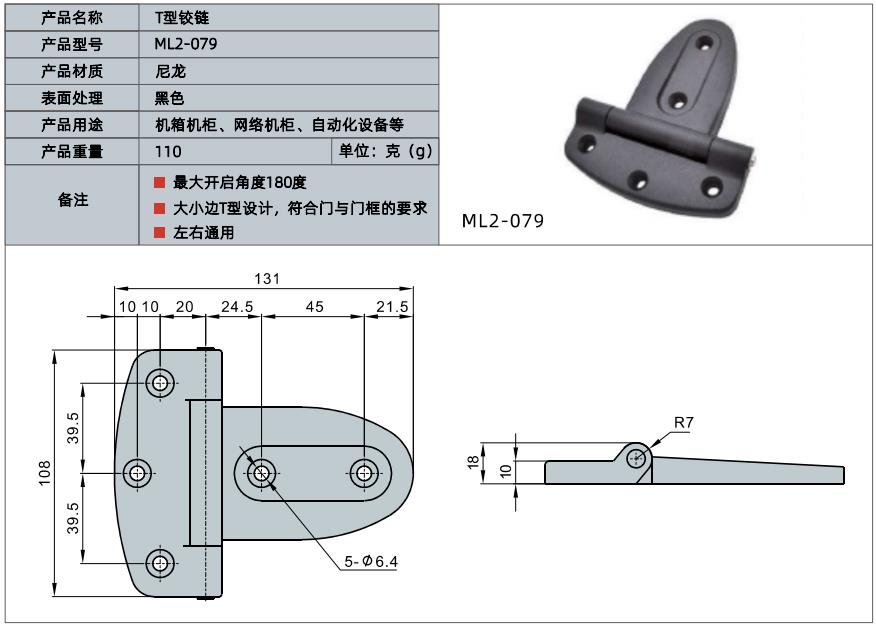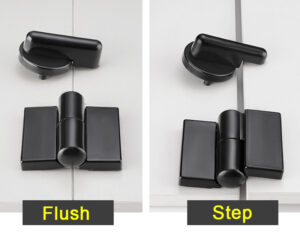When it comes to choosing hinges for industrial applications, it’s essential to understand the differences between various materials to make an informed decision. In this article, we will explore the distinctions between plastic hinges and nylon hinges, two common options in the market. By understanding their characteristics, differences, and similarities, you can choose the right hinge material for your specific industrial needs.

What are Plastic Hinges?
Plastic hinges are hinges made from various types of plastic materials, such as polypropylene, polyethylene, or polycarbonate. These hinges offer a lightweight and cost-effective solution for industrial applications. Plastic hinges are known for their corrosion resistance, making them suitable for environments where exposure to moisture or chemicals is a concern. Additionally, they provide good insulation properties, making them ideal for applications that require electrical or thermal isolation.
What are Nylon Hinges?
Nylon hinges, as the name suggests, are hinges made from nylon, a type of synthetic polymer known for its strength and durability. Nylon hinges offer excellent mechanical properties, including high tensile strength and impact resistance. They are capable of withstanding heavy loads and repetitive use, making them suitable for industrial applications where reliability and longevity are crucial. Nylon hinges also exhibit good resistance to wear, abrasion, and chemicals, enhancing their suitability for harsh environments.

Differences Between Plastic and Nylon Hinges
One significant difference between plastic hinges and nylon hinges lies in their structural composition. Plastic hinges are made from a broader range of plastic materials, while nylon hinges specifically utilize nylon as the base material. Additionally, nylon hinges generally offer higher strength and load-bearing capacity compared to plastic hinges, making them suitable for more demanding applications. Plastic hinges, on the other hand, excel in corrosion resistance and electrical insulation properties.
Another distinction is the temperature resistance. Nylon hinges typically have a higher melting point and can withstand higher temperatures compared to plastic hinges. This makes nylon hinges better suited for applications where elevated temperatures or thermal stress may be a concern.
Similarities Between Plastic and Nylon Hinges
Both plastic hinges and nylon hinges offer advantages in industrial applications. They are lightweight, which contributes to ease of installation and reduced strain on supporting structures. Both types of hinges also provide excellent resistance to corrosion, making them suitable for environments where moisture or chemical exposure is prevalent. Additionally, plastic hinges and nylon hinges are available in a variety of sizes, shapes, and configurations, allowing for customization and compatibility with different applications.
Choose between Plastic or Nylon Hinges
When it comes to selecting between plastic hinges and nylon hinges, it’s crucial to consider the specific requirements of your industrial application. If you prioritize corrosion resistance, electrical insulation, and cost-effectiveness, the hinges may be the right choice. On the other hand, if you require higher strength, durability, and temperature resistance, nylon hinges offer superior performance.
Evaluate factors such as load-bearing capacity, environmental conditions, temperature range, and long-term durability to make an informed decision. Consulting with industry experts or suppliers can also provide valuable insights and guidance in selecting the most suitable hinge material for your industrial needs. IHINGES is a manufacturer specializing in the production of industrial hinges. We can customize hinges in different materials and constructions for our customers. Feel free to contact us for the latest quotations and solutions.
Conclusion
In summary, plastic hinges and nylon hinges are both viable options for industrial applications, each offering distinct advantages. These hinges excel in corrosion resistance and electrical insulation properties, while nylon hinges provide superior strength, durability, and temperature resistance. By understanding their differences and similarities, you can make an informed decision and choose the appropriate hinge material that meets your specific industrial requirements.







